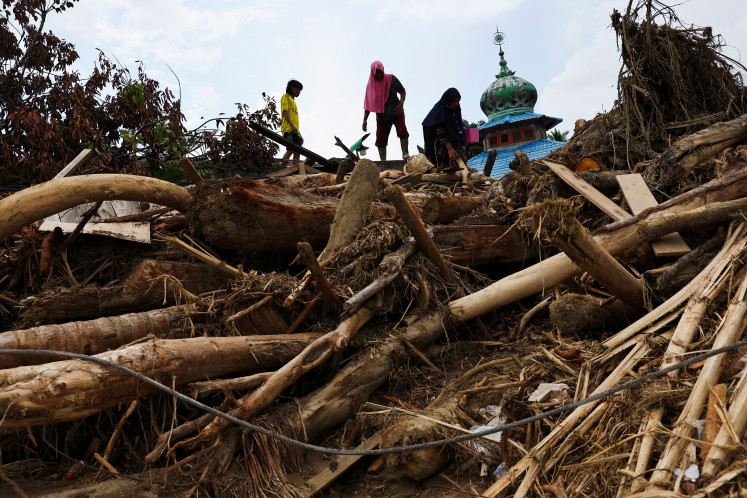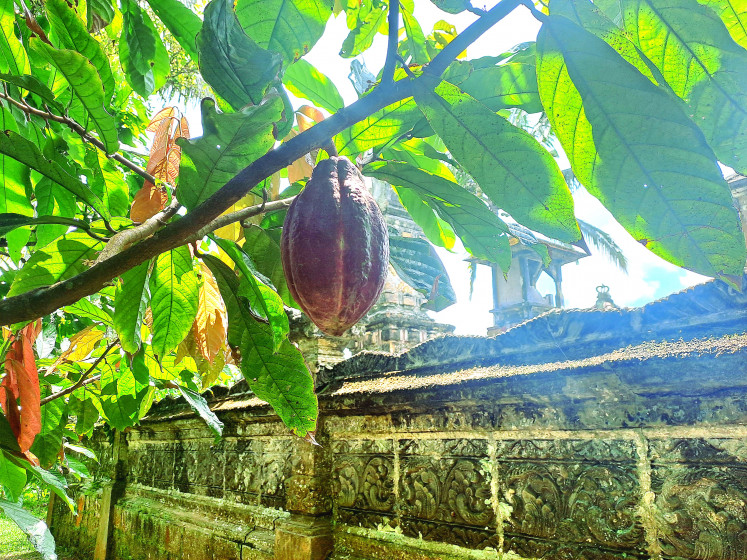Popular Reads
Top Results
Can't find what you're looking for?
View all search resultsPopular Reads
Top Results
Can't find what you're looking for?
View all search resultsJapan vows to strengthen partnership with ASEAN
Japan has called for a stronger partnership with ASEAN, not only in economic matters but also in political, security and cultural affairs, as the Southeast Asian regional grouping turns 50 this year
Change text size
Gift Premium Articles
to Anyone
J
apan has called for a stronger partnership with ASEAN, not only in economic matters but also in political, security and cultural affairs, as the Southeast Asian regional grouping turns 50 this year.
Japanese Ambassador to ASEAN Kazuo Sunaga emphasized that while the relationships between the two sides could be traced back to 1973, or six years after the Bangkok Declaration that formed the bloc, Japan had been engaged in economic cooperation with ASEAN member states since the 1950s.
“This long time of partnership provides a strong foundation for Japan’s relations with ASEAN. It is important for Japan and ASEAN to keep strengthening their partnership,” Sunaga told a forum held by the Centre for Strategic and International Studies (CSIS) on Wednesday.
Based on ASEAN data, Japan became the second-largest outside trading partner for ASEAN in 2015. ASEAN-Japanese two-way trade reached US$238.1 billion, while China ranked first with its bilateral trade with ASEAN members totaling US$345.8 billion.
At a meeting between ASEAN representatives and the Japan Joint Cooperation Committee (JCC) in Jakarta last week, both sides reaffirmed their commitment to doubling two-way trade and investment by 2022. They also pledged to step up joint effort addressing other challenges, including terrorism and cybercrime.
The Japan International Cooperation Agency (JICA), meanwhile, has poured ¥13.61 trillion (US$122.29 billion) in overseas development assistance (ODA) comprising loans, grants and technical cooperation to ASEAN in 2015.
Indonesia is the largest beneficiary of those funds with ¥4.72 trillion, followed by the Philippines with ¥2.44 trillion and Vietnam with ¥2.39 trillion. Currently, the JICA is supporting the development of the Jakarta Mass Rapid Transit (MRT) system and Patimban Port in Subang, West Java, among other projects.
Shafiah Fifi Muhibat, a senior fellow from the S. Rajaratnam School of International Studies in Singapore, underlined the importance of extending cooperation in maritime security, as past efforts might not suffice to cope with the current maritime threats of piracy and terrorism.
In July 2004, Japan acceded to the Treaty of Amity and Cooperation in Southeast Asia and has reaffirmed its support at the ASEAN-Japan Summit in September 2016 for the maintenance of peace and the importance of maritime security.
Muhibat cited data on sea robbery incidents in Southeast Asia released by the International Maritime Bureau Piracy Reporting Center, which showed that such incidents increased between 2012 and 2015 after previously showing a decreasing trend. There were 110 incidents in 2012, which increased to 174 in 2015.
“Japan contributed in combating piracy through its role in the Straits of Malacca and ReCAAP [Regional Cooperation Agreement on Combating Piracy and Armed Robbery against Ships in Asia]. But in the future we need new initiatives to overcome current challenges,” she said.
Meanwhile, Indonesian Foreign Ministry Director General for ASEAN Jose Tavares praised Japan as an extra-regional country for the development of the region, saying the exchange of youth between the two sides was important for human resource development.
Jose cited the JENESYS program (Japan-East Asia Network of Exchange for Students and Youths) that has seen thousands of ASEAN youth visit Japan.
“Another important contribution from Japan is helping start-ups and small and medium enterprises from this region,” Jose said.
In his opinion, the rise of foreign fighters linked to the Islamic State (IS) in Marawi, Philippines, was a new challenge the region needed to address immediately, before it might spread to other countries.
He said Japan could help ASEAN establish a database that could be accessed by all the member countries to provide better information for fighting terrorism.
“Cross-border operations are not working effectively, and we need extra measures to fight this kind of threat,” Jose said.










